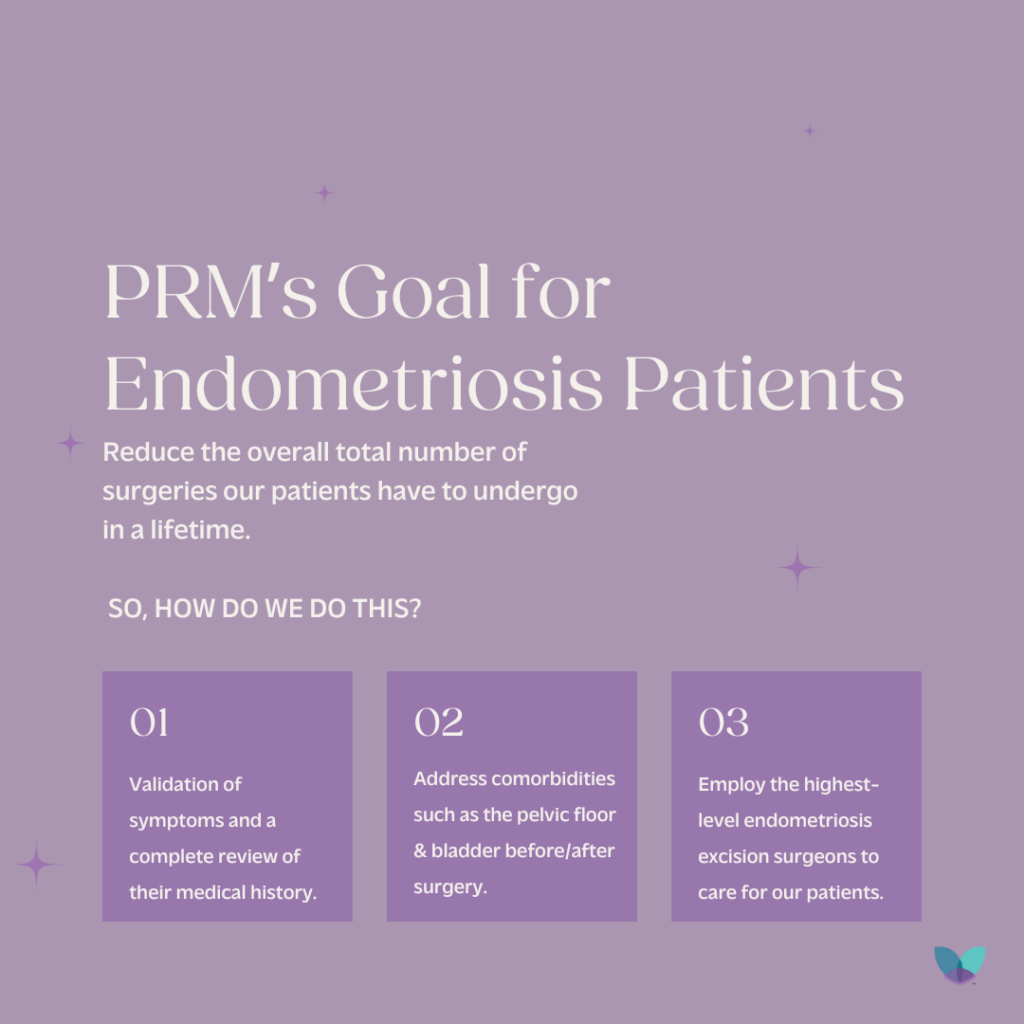With expert input from Dr. Madhu Bagaria, Endometriosis Excision Surgeon in New York and New Jersey

Endometriosis is a systemic, inflammatory disease process that causes pelvic pain and symptoms such as:
- painful periods
- pain with sex
- abdominal pain
- bladder issues such as pain with urination and urinary frequency
While there is no cure for endometriosis at this time, laparoscopic excision surgery is considered the gold standard treatment that involves removing endometriosis lesions within the body.
At PRM, we are a team of endometriosis and pelvic pain specialists caring for endo patients through the PRM Center of Excellence. One of our main goals for endometriosis patients is to reduce the total number of surgeries that endometriosis patients undergo throughout their lifetime. With only around 100 laparoscopic excision surgeons available worldwide – and currently three on staff with our team (and growing!) – knowing how to choose an endometriosis excision surgeon is key in reducing the number of surgeries you have in your life.
Download Your Free Guide to Choosing A Surgeon Here

Dr. Madhu Bagaria, one of the 100 laparoscopic excision surgeons available, of Pelvic Rehabilitation Medicine in New York and New Jersey, emphasizes the most important things that patients should know before they undergo endometriosis excision surgery:
Choose A Surgeon Who Performs Excision Surgery
There are two main types of surgery for endometriosis: excision and ablative. Ablative surgery burns the lesions, while excision surgery removes the disease from its roots. It’s essential to discuss the type of surgery with your surgeon and always choose excision surgery for better long-term outcomes.
Excision surgery is the better option because it focuses on complete removal of the disease, while ablation burns the disease and leaves scar tissue which can lead to more problems later on.
Learn more about endometriosis excision surgery at PRM
Endometriosis is a Whole-Body Disease
Endometriosis can affect areas beyond the pelvis, including the diaphragm, appendix, bowel, and abdominal wall. An experienced surgeon will search for endometriosis within and outside of the pelvic floor, and be able to excise lesions from these areas for a complete removal of the disease.
Tip: Finding a surgeon who also works alongside a lifetime management team is key. You want a team of specialists that helps you receive care before and after your surgery. At PRM, we offer pre and post-hab treatment through the PRM Protocol™️, a proprietary, patented, simple, office-based procedure to treat the symptoms of chronic abdominal pelvic pain by a direct treatment of inflamed pelvic nerves and spastic pelvic muscles which are often the root cause of symptoms.
This treatment consists of a series of pelvic nerve and muscle treatments to target inflammation in the pelvis, nerve pain, and pelvic floor muscle spasms, and is key to preparing your body for excision surgery.
Help in Understanding Your Surgery
Despite being complex, endometriosis excision surgery can often be performed using small incisions. Your endometriosis excision surgeon should share with you the details about the procedure and help you to understand what is expected to happen during the surgery, based on your medical history and symptoms.
Your surgeon should be able to confidently share these details with you, based on your unique case of endometriosis.
Schedule An Endometriosis Consultation
We know that understanding your symptoms, achieving an endometriosis diagnosis, and deciding whether or not you need endometriosis excision surgery can be challenging. We encourage you to meet with a pelvic pain or endometriosis excision specialist to help you understand all of the information out there, as well as the symptoms that you may be experiencing.
